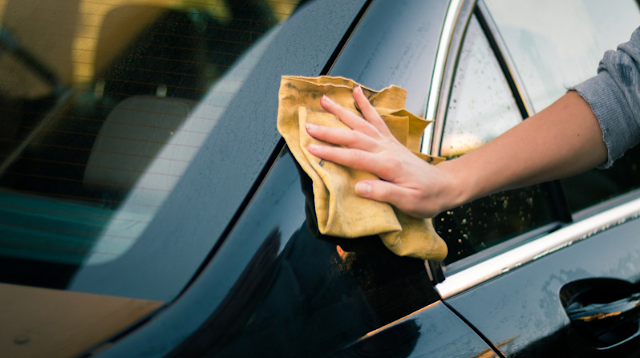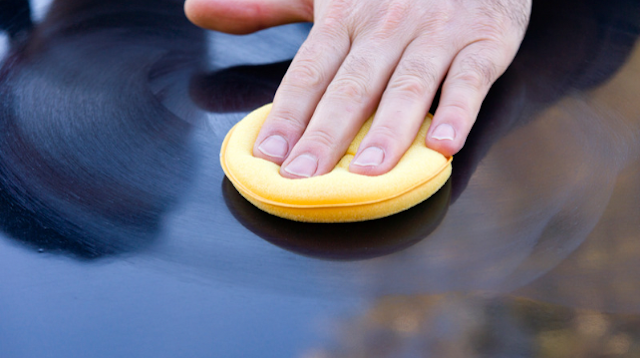Car Wax Versus Paint Sealant: A Showdown for Paint Protection
Protecting our cars' paint is akin to caring for our skin. Think about it. Like our skin, a vehicle's paint job faces daily assaults from the elements.
Two champions have emerged in the battle against these environmental aggressors: car wax and paint sealant. But which offers the superior defense? Let's dive in.
What is a Car Wax?
Car wax, a staple in automotive care, has been used by car enthusiasts and everyday drivers for decades. Often seen as the finishing touch to a freshly washed car, it adds aesthetic and protective qualities to its exterior. But what exactly is a car wax?
Origins and History of Car Wax
Since the earliest days of the automobile, car wax has been a go-to for vehicle enthusiasts. Traditionally derived from natural sources like carnauba, a Brazilian palm tree wax, it has evolved with modern chemistry, but the heart of its protective properties remains consistent.Composition of Most Car Wax Products in the Market
True to its roots, car wax often consists of natural waxes, oils, and solvents. This gives it that rich, warm glow many classic car enthusiasts swear by.Benefits of Using Car Wax
Here are some of the benefits of using car wax.1. Natural Deep Shine: You get an unmistakable deep glow from a freshly waxed car.
2. Water Beading: Those little water droplets that slide right off? That's the magic of wax.
3. Temporary Protection: A good waxing can shield your car's paint from dirt, moisture, and some UV rays, albeit for a shorter duration.
Limitations of Using Car Wax
Like any other product, car wax has its fair share of limitations.1. Durability
The beauty of wax can be fleeting. It tends to wear off more quickly, especially in harsh conditions.
The beauty of wax can be fleeting. It tends to wear off more quickly, especially in harsh conditions.
2. Frequent Application
To maintain that glossy look, you'll be reapplying more often.
To maintain that glossy look, you'll be reapplying more often.
3. Heat Sensitivity
A hot summer day can diminish the effectiveness of car wax.
A hot summer day can diminish the effectiveness of car wax.
What is a Car Paint Sealant?
Maintaining a car's shine and protection in automotive detailing goes beyond just a simple wash. One product that has gained popularity recently among car enthusiasts is the car paint sealant. Often compared to car wax but distinct in its properties, what exactly is a car paint sealant?
The Science Behind Paint Sealants
While car wax leans on nature, paint sealant is a marvel of modern chemistry. These sealants are built on synthetic polymers and bond with the car's paint, creating a durable protective layer.Benefits of Car Paint Sealants
By using a high-quality car paint sealant, you and your beloved vehicle can enjoy these benefits:1. Long-lasting Protection: Sealants offer protection from the sun's UV rays, contaminants, and minor abrasions for months.
2. Consistent Finish: You'll get a consistent, slick shine every time.
3. Weather Durability: A paint sealant remains steadfast despite the blazing sun or a snowstorm.
Limitations of Paint Sealants
While paint sealants are obviously the better choice, they still have a few limitations, depending on how one may look at it.1. Natural Shine: The shine from a sealant may come off as too synthetic or glossy for purists.
2. Cost: The technology behind sealants can sometimes come with a steeper price tag.
Practical Comparisons Between Car Wax and Paint Sealants
Both car wax and paint sealants offer unique benefits, but how do they stack up in real-world situations? Before diving into the specifics, let's understand their fundamental differences and impact on a car's exterior.
- Application: Both car wax and paint sealant require some elbow grease. But while waxing can be a therapeutic ritual for some, paint sealants often promise quicker application with less frequent touch-ups.
- Maintenance: Wax demands dedication. Depending on the product and environmental conditions, you'll be re-waxing every few weeks to months. Sealants, however, can last anywhere from 6 months to a year.
- Cost: The upfront cost of paint sealant might be higher, but factor in the less frequent applications, and you might find them cost-effective in the long run.
- Performance: In the real world, both have their merits. Wax will give you that classic car shine, especially on sunny days. However, in inclement weather, the resilience of paint sealant becomes evident.
Hybrid Solutions
In the quest for the perfect finish, some products combine the best of both worlds today. Imagine a wax's warm glow combined with a sealant's durability. These hybrids might be the golden mean for those torn between the two.
Car Wax vs Car Paint Sealant: Which One is Better?
Both car wax and paint sealant have their legions of fans. Waxes are your best bet if you're after a short-term, deep, and warm shine and don't mind putting in a bit of effort.
If you're looking for longevity and robust protection, sealants stand out. But remember, there's no one-size-fits-all. It's all about what suits your needs and your vehicle.
FAQ Section
Q: How often should I wax my car?A: Every few weeks to months, depending on environmental conditions and the specific product.
Q: Is paint sealant harmful to my car's paint?
A: No, it's designed to protect it. However, always follow the manufacturer's application guidelines.
Q: Can I use both wax and sealant on my car?
A: Yes, some enthusiasts layer wax over sealant for combined benefits. Ensure compatibility before application.
Whether you're team wax or team sealant, one thing's clear: taking steps to protect your car's skin is always a good move. After all, it's not just about looking good— it's about longevity and preserving value. Safe driving and shining on!








